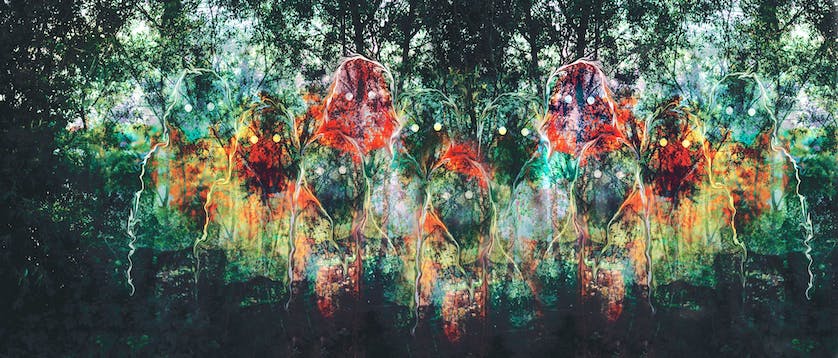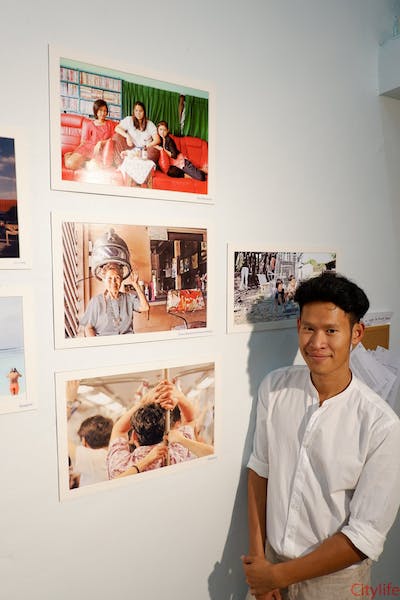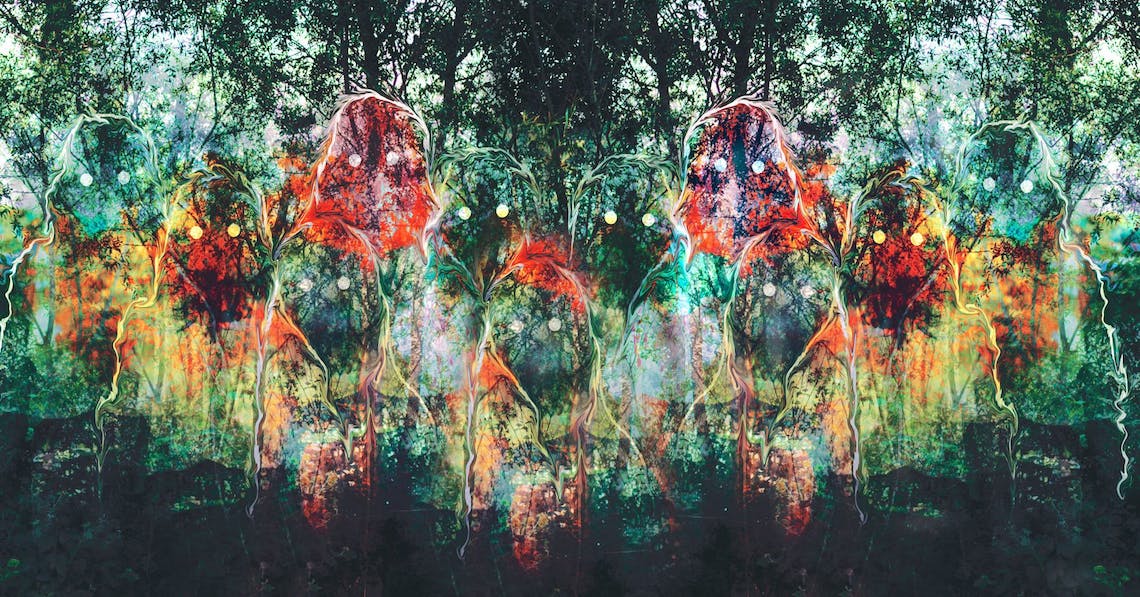When we agreed on the theme “What does it mean to be Thai?” I thought it was an excellent idea. I still do. Little did I know that it was a near impossible topic to cover. I was overwhelmed with frustration as I further introspected. Many things that I came up with about being Thai is all clichés, full of banal stereotypes; some naively positive and some serve for racist humours. What being Thai means exactly is perhaps forever evolving I came to believe, maybe not really existing. Failing to come up with anything, I will now stick to telling you my story. My truth.

I moved to Chiang Mai from Bangkok in August 2014. An impulsive job application turn out to be one of the most life changing event. I was particularly excited to hear from my friend Richard, who was one of the location-independent pioneers in the city in 2004, that I would love Chiang Mai because the international community here was much more open and different from the ones in Bangkok. He did know that I had the yearning to break free from the Thai identity.
Growing up in Thailand I remember how much I hated going to school. I was bullied every day. I was teased for my voice, for my face, for not acting masculine enough, for not playing football with others. “Faggot’ they would call me. One of these boys would aim to hit their plastic football at me when I walked pass. On another occasion they would try to poke my butts with a stick when I was unaware. Teachers would do some things but never seriously. “Boys will be boys. It is better to have them aggressive rather than timid and sissy”. That’s what I heard from adults during those days.
As things were getting worse so were my self-esteem. My body started to crouch, shoulders slumped while heart was getting more and more swollen with suppressed anger. When I had my first English lessons at 11 years old, I told myself “I am gonna get so good at this, and I will leave this country one day”.
The feeling of being ostracized and abused pushed me to look beyond. I knew I wanted to belong but it could not be there where I was. I started to make foreign friends when I could and sometimes acted as if English was my first language even though I knew it never was and never would be. I would only read and write in English except when I had to translate something in Thai.
I have my Thai friends but I often feel like our connection is not that fulfilled. My ability to express my feelings in Thai was stalled at some point. I became a good listener but I could never express how I felt back. Now I am relying on English, my second language, the only language I grew up learning how to share my feelings with anyone. I know this all sounds fucked up and weird. And trust me I do feel like I am being pretentious, sometimes.
Perhaps this is what being ostracized has done to you. Some people might want to take a revenge but I prefer to avert and plan my escape. Not to say that I didn’t enjoy some retribution. When a foreign person told me how great they thought about Thailand and Thai people, I would mention some negative qualities to bring them back to the ground, the reality, my reality. I feel ashamed about it now.
So when Rich told me Chiang Mai was the place to be for international community, I thought this was it! I would go to these meetings organised mostly by expats so I could forget about my Thainess and I could also express myself without national baggage at these events. Ironically, it was these kind of events that kept reminding me the most about my Thai identity.

Chiang Mai has this uniqueness where there are English speaking groups and subcultures. The vibe of it sometimes reminds me of this clique in the film ‘The Beach’, missing only the beach itself. A lot of the expats are definitely hungry to learn more and better assimilate into the Thai culture, a place they too consider home. Unfortunately, there seems to always be a disparity between the locals and the expats here. Language barriers? Cultural barriers? I will not go there in this essay but I totally understand the impression an American woman made when I was one of a few Thai that showed up at her charity event “I am so happy a Thai person decided to join at last” she said.
For that same reason, I sometimes resist telling the non-Thai people I met here where I am from. The moment someone learned that I am Thai I felt like a label was plastered on my forehead. I would get a lot of question about Thailand or the ever so repeating “You Thais are like this and like that”. I appreciate the curiosity but it messes up with my insecurity once again.
I do wonder if some people here want to hang out with me because of who I am or just the idea of what I represent. My friend Julianne, someone who is an empathy soulmate nailed it when she said “You probably felt used as a pass, kinda like a ticket to Thailand and you wonder if you’re truly seen for who you really are”.
I later discovered that what’s worse than not being seen for who you are is not being seen at all. At an acquaintance’s birthday dinner a few years ago, where I was the only Thai. An expat woman who was about to leave the party stood up and walked to our table. She went: “I am gonna leave now but let me try to remember you guys’ names again?” It was a table of 4, all of whom except myself were a Native-English speaking expats. As she looked at each of them she said “You’re Chris. You’re Tom. And you are Tyler”. I was preparing to help her with my less conventional name but she never looked at me.
“Goodnight” she said, still not looking at me.
I thought for a moment it was a joke. It’s too late but I regret not speaking up because I could only now speculate what happened and in the most part just ruminate. What I can tell for certain is how the pain of not being seen is not any less than the pain of verbal abuse. Perhaps it is even greater.
There would also be other incidents where I felt excluded by just looking Thai. At an event a guy would walk in and start chatting with us. It was a group of three including me standing in circle, the other two are white Europeans. He started chatting with my friends and reached out to shake their hands. I couldn’t stand it so I forced my hand out to shake his. I needed to get this right once by insisting that I too exist. When things like this happen, the worst that I could think of is covert racism. But it was often too painful to go there so I resorted to talking to people to get some other perspectives and asking some questions.
“Why would they assume that an Asian person must be Thai?” “Would people feel more comfortable with people who look and sound like them?” “ Perhaps I overthink things” “But it has happened to me 5 times” “What would non-Thai Asians feel?” “How have their experiences been similar or different?” “Perhaps they didn’t really see you” “Perhaps they thought that Thais don’t speak English, I mean statistically that is kinda true” “Perhaps they were afraid that they would feel embarrassed talking to someone who doesn’t understand them” so on and forth.
However positive thinking and intellectualization help, they do not heal. I can never silence a thought with another thought. I cannot use a logical explanation to make myself feel better. When my heart is broken empathy is what it needs. After hearing the story of the woman in the restaurant, my friend Irene said, “I am sorry, Jaem. This made me feel sad. It reminds me a bit of colonialism, exploiting the land and ignore the natives.” You may think this is a radical statement, but what I feel is important is the empathy she felt to my story.
As the issue of my identity bothered me more intensely, I became more and more a social recluse. I was so traumatized I tried to avoid a social event organized by the expat communities. I don’t want to be either the Thai one or the invisible one. I am now feeling like a spy betraying on her homeland and has nowhere to go to. I felt lonely and depressed. This sad thought came to my mind that for the Chiang Mai local I am an expat from Bangkok, for the expats I am the Thai local. I am part of both worlds but belong to none.
I wrote to Steven, a wise guy I know from Chiang Mai, asking for a recommendation for someone.. My psychologist who I could not name but I am so grateful for made an observation in our first few session that I was smiling every time I told him about a traumatic event. This somehow brought me closer to my Thainess – knowing how the culture taught us to smile in awkward situations. At the beginning of the therapy, it was for something else, but the deeper we tread the deeper we entered into my identity complex, suppressed anger, and the sense of inadequacy.
I am beginning to recover. I don’t know what a Thai person is supposed to be or to feel. But now I try to embrace it “the fact that I am Thai and sometimes I feel like a foreigner in my homeland and sometimes I feel discriminated too” It is a bit of a personal #metoo movement for me. Now that I told people openly about this, some would think of it as bullshit, but for sure some could empathise. I hope some of this writing tells you that you belong here too where you are, with me.
So, what does it mean to be Thai, to me? Nowadays I take it literally. One of the speculated meaning of the word Thai is “to be free”. In the past, when the Thai slaves were set free, we would say “The people became Thai”. By that definition, the freest moment or the most Thai moment I am getting the closest to these days is when I was sitting on a cushion, focusing on my breath, meditating.
There were times I forgot everything: my nationality, gender, histories, pain and even happiness. For a brief moment, nothing but life itself matters. I have this theory that sometimes we had to forget everything to remember who we are; beings. Going by this definition, I can wholeheartedly find the courage to embrace and announce that I am Thai and I am free. And I encourage you, readers, no matter what passports you hold, to do the same.
What does it mean to be to be Thai? Exhibition is on display until June 1st at Kit’ncaboodle
